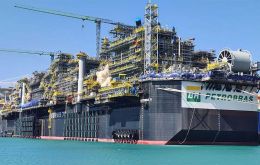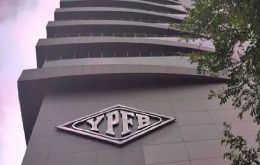MercoPress. South Atlantic News Agency
Energy & Oil
-
Thursday, November 13th 2025 - 20:42 UTC
Trump pardons Lewis in insider trading case

British billionaire Joe Lewis, who has significant business interests in Argentine Patagonia and other parts of South America, has been granted an official pardon by US President Donald Trump, it was confirmed Thursday. The measure came after Lewis, 88, pleaded guilty last year in New York to insider trading charges. He was subsequently sentenced to pay a US$5 million fine and serve three years of probation.
-
Tuesday, November 11th 2025 - 08:43 UTC
Chinese competition authorities greenlight joint lithium venture in Chile

China's State Administration for Market Regulation (SAMR) approved the partnership between Chile's state-owned copper company Codelco and private miner SQM to develop lithium resources in the Salar de Atacama, prompting Chile's Mining Minister Aurora Williams to hail the decision as “good news.”
-
Saturday, November 8th 2025 - 10:00 UTC
Dorgathen resigns as YPFB chief as Bolivia's fuel crisis deepens

Armin Dorgathen Tapia has submitted his irrevocable resignation as Executive President of Yacimientos Petrolíferos Fiscales Bolivianos (YPFB), the state-owned oil company, effective Friday. His departure comes amidst growing controversy surrounding the Botrading case and just hours before the inauguration of President-elect Rodrigo Paz.
-
Wednesday, October 29th 2025 - 11:29 UTC
Petrobras' output reaches 3.14 million barrels a day in 3Q of 2025

Brazil’s state-run oil company Petrobras achieved an average production of oil, natural gas liquids, and natural gas of 3.14 million barrels of oil equivalent per day in the third quarter of 2025, or 7.6% more than in the second quarter of this year and 16.9% higher than in the third quarter of 2024.
-
Tuesday, October 28th 2025 - 09:19 UTC
Bolivia: Private fuel import bill signed into law to tackle shortages

Bolivian President Luis Arce Catacora enacted the so-called “Short Law” on Monday to tackle fuel shortages and guarantee the supply of diesel and gasoline. The legislation, which originated with the Pro Santa Cruz Committee and was passed by the Legislative Assembly last week, offers an alternative solution to the recurring fuel scarcity.
-
Tuesday, October 21st 2025 - 10:02 UTC
Amazon: Petrobras cleared to start drilling on Equatorial Margin

Brazil's state-owned oil company, Petrobras, has received a license from the Brazilian Institute of the Environment and Renewable Natural Resources (Ibama) to begin exploratory oil drilling on the Equatorial Margin of the Amazon, an area with high hydrocarbon potential, it was announced on Monday.
-
Tuesday, October 21st 2025 - 08:26 UTC
Oil heading below US$ 50 per barrel anticipates Energy Agency

When oil prices in the international market are sliding faster than expected, already in the range of US$ 50 the barrel, the International Energy Agency, IEA in its latest report anticipated that because of soaring “supply and subdued demand”, oil oversupply will be larger than expected, both in 2025 and 2026. IEA warns that while demand growth is down, supply growth will lead to a record supply overhang, since oil stocks are already soaring, mainly that stockpiled in tankers in water.
-
Tuesday, October 21st 2025 - 08:23 UTC
Mexico shipping oil to energy starved Cuba

So far this year, Mexico has shipped more than US$ 3 billion worth of subsidized fuel to Cuba through Gasolinas Bienestar, a subsidiary of Pemex, according to an investigation by Mexicanos Contra la Corrupción y la Impunidad (MCCI), as reported by OilPrice.
-
Thursday, October 16th 2025 - 19:55 UTC
Bolivian Senate passes bill allowing direct fuel imports

Bolivia's Senate has passed a bill allowing for the direct import of fuels by petrol stations to make up for the shortages stemming from the State-run oil company YPFB's lack of US dollars to secure further imports. The initiative was then sent to the Lower House for final approval.
-
Wednesday, October 15th 2025 - 20:35 UTC
Colombia's GeoPark announces investment in Vaca Muerta

Colombian oil company GeoPark announced this week its plans to make a significant investment and operational agreement for the Vaca Muerta unconventional hydrocarbon reserve in Argentine Patagonia.
